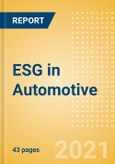Sustainability is inexorably tied to the future of the automotive industry and is the defining theme of the industry. While its environmental impact has long been seen as a challenge, social and governance factors are now coming to the fore, particularly as connected, autonomous, shared, and electric (CASE) megatrends transform the industry. Automakers are increasingly marketing sustainability as central to their value propositions, reflected by the trend in 2020 by several to integrate their financial and sustainability reporting methods. A significant challenge is managing the transition profitably, without which innovation and survival won’t be possible, no matter the strength of ESG credentials. The complexity of ESG is that it is not zero-sum.
This thematic research report takes an in-depth look at the impact of environmental, social, and governance (ESG) factors on the automotive industry. Our analysis includes The publisher's ESG framework, the trends shaping the ESG theme in automotive, the challenges posed by the theme to the automotive industry. We also include case studies detailing leaders and laggards in each of the sub-themes of ESG, along with a timeline of past and future milestones. In the companies’ section, we analyse the ESG-specific moves being made by major automakers and suppliers to set out the landscape and see what further trends are emerging. Finally, The publisher's ‘Parts and Tires’ and ‘Vehicle Manufacturing’ scorecards highlight leading and lagging companies based on the key themes identified as impacting the automotive sector.
Key Highlights
- The publisher's ESG framework, which breaks down sustainability by identifying contributing factors and mitigating actions.
- Ten important technology and macroeconomic trends that will shape the ESG theme in the automotive sector over the next 12 to 24 months.
- The publisher's ESG action feedback loop, which explains the incentive behind taking ESG-related actions.
- A deep-dive into the key challenges that traditional automakers and suppliers face from each of the ESG sub-themes (environmental, social, and governance).
- Case studies identifying leaders and laggards in each of the ESG sub-themes and the reasons behind this.
- Detailed profiles of what moves major automakers and suppliers are making in the ESG theme.
- The publisher's ‘Parts and Tires’ and ‘Vehicle Manufacturing’ scorecards, which rank the leadership of companies in the key themes disrupting their industry.
Scope
- This report is part of our ecosystem of thematic investment research reports, supported by our “thematic engine”.
- The publisher has developed a unique thematic methodology for valuing technology, media and telecom companies based on their relative strength in the big investment themes that are impacting their industry. Whilst most investment research is underpinned by backwards looking company valuation models, The publisher's thematic methodology identifies which companies are best placed to succeed in a future filled with multiple disruptive threats.
- To do this, the publisher tracks the performance of the top 600 technology, media and telecom stocks against the 50 most important themes driving their earnings, generating 30,000 thematic scores. The algorithms in The publisher's “thematic engine” help to clearly identify the winners and losers within the TMT sector.
- Our 600 TMT stocks are categorised into 18 sectors. Each sector scorecard has a thematic screen, a risk screen and a valuation screen. Our thematic research ecosystem has a three-tiered reporting structure: single theme, multi-theme and sector scorecard. This report is a Multi-Theme report, covering all stocks, all sectors and all themes, giving readers a strong sense of how everything fits together and how conflicting themes might interact with one another.
Reasons to Buy
- This report is crucial to understand how ESG is changing and will continue to change the automotive industry. It is essential reading to identify trends and track competitor activity and innovation in the ESG theme. This report shows how the theme can both serve to challenge but also differentiate brands in the face of the long-term industry threats in the automotive sector.
- Prioritise investments in ESG-related areas which will deliver the best results using case studies and information on competitors’ activities.
- Develop value propositions for your sustainability credentials that will resonate with prospective clients in the automotive industry and consumers.
- Identify and get ahead on the emerging trends in ESG specific to the industry and how these developments might advance in the future.
Who should buy?
- Executives in the automotive and adjacent industries who want to understand how the ESG theme is disrupting their competitive landscape.
- Specialist vendors who want to identify market opportunities based on incumbent players’ positioning.
- Our unique differentiator, compared to all our rival thematic research houses, is that our thematic engine has a proven track record of predicting winners and losers.
Table of Contents
- Executive summary
- The Publisher's ESG framework
- Trends
- The ESG action feedback loop
- ESG challenges in automotive
- Case studies
- ESG timeline
- Companies
- Sector scorecards
- Glossary
- Further reading
- Our thematic research methodology
- About the Publisher
- Contact the Publisher
Companies Mentioned (Partial List)
A selection of companies mentioned in this report includes, but is not limited to:
- Bosch
- BMW
- Bridgestone
- Continental
- Daimler
- Denso
- Ford
- Honda
- Hyundai
- Hyundai Mobis
- General Motors
- Magna International
- Michelin
- Stellantis
- Tesla
- Toyota
- Valeo
- Volkswagen
- Volvo








